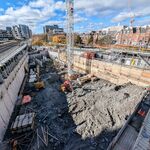People with mental health and drug issues can get help.
May I suggest that you actually talk to someone who works in rehab, or detox, or an emergency room, and that you ask them what what the wait is for inpatient addiction treatment in Toronto.
I think you will find there is a wait list................
Waits vary over time and place, but the average wait in Canada over the last few years is about 5 weeks just to get counselling and about 5 months to get into residential treatment.
So if someone in withdrawal or otherwise having a sober moment and having hit bottom reaches out for help.........what we do is send them back out into the street......with 'Don't call us, we'll call you' .....of course we don't give them a phone and send them back into the very environment that fosters their problems.
Most of them just don't want it.
I think 'most' is a strong word. I think you would find that many, during lucid/sober moments would like help, but don't know who to ask, and if they do, they get put on an interminable wait list.
In the event they ultimately get a spot, no one can reach them to tell them; and/or they are no longer lucid/sober because the moment has passed.
So we should make it easier for them to get access to help
Certainly.
but after that, there is nothing else we can do to help them
Disagree. While I think involuntary treatment should be a last resort, I think its reasonable to put on the table, with safeguards, for people who clearly are unable to function in society and are causing some level of harm to themselves, or others.
Additionally, we need to remember that not everyone in encampments are drug involved, though its certainly quite common. Aside from other forms of mental illness, there are people who are simply homeless, and desperate, and who either can't find a shelter bed, or who have found our shelters so dangerous, so rule-bound, so lacking in privacy with dubious hygiene that they think a park is preferable in all but the worst weather.
. Letting them destroy our neighbourhoods isn't a solution.
No, its not. Though I think that's a bit overdone; if you said 'diminish' I would be on board.
****
FWIW, I've already suggested somewhat more passive changes to select parks that would tend to discourage encampments that have the advantage of not appearing heartless. Introducing irrigation (sprinklers) which would be good horticultural practice anyway, often serves to discourage the pitching of tents.
So does activating a park with positive uses; rarely do people even pitch a tent on a flower bed, and you don't see them mid-playground, or sports field.
For all of the above, I don't think 'defensive design' is the key to solving this issue.
I think treatment and housing are by the far the top two, followed by broader anti-poverty measures, and then 'shelters' that provide greater privacy, flexibility and security such that people are less likely to avoid them.
But defensive design has a role to play when parks come up for work.




